关系副词引导的定语从句
关系副词引导的定语从句

Ⅲ. 关系副词引导的定语从句:When 指时间,在定语从句中作时间状语。
其先行词是表时间的名词(如:time, day, week, tear, month, etc.)1. He came last night when I was out.2. We will put off the picnic until next week, when the weather would be better.注意:先行词为"时间名词",可用when引导定语从句,when在定语从句中作状语;还可以用which或that 引导,which或that在从句中作主语或宾语。
比较: 1. I still remember the day when /on which my brother joined the army.(作状语)Next month, when you will be in your hometown, is just around the corner.2. I still remember the days which/that we spent together. (作宾语)Next winter which/that you'll spend in Harbin, I’m sure, will be exciting.3. I shall never forget the day when Shen Zhou Ⅴwas launched, which has a great effect on my life.There are occasions when joking is not permissible.Where 指地点,在定语从句中作地点状语。
其先行词是表示地点的名词,如:place, school, factory, room, etc. 如:1. This is the place where I was born.2. I live in the room where /in which he used to live.注意:先行词是"地点名词",定语从句可用where引导,还可用which或that引导,which/that 在从句中作主语或宾语。
关系副词定语从句

关系代词与关系副词的选用
定语从句的引导词用关系代词还是关系副词可用以 下方法判断:
用法
依据
根据从句谓语动 是及物动词,后面若无宾语,用关系
词
代词;是不及物动词则用关系副词
根据关系词在从 把关系词放在定语从句中,若作主语 句中作的成分 或宾语用关系代词;作状语则用关系
副词
This is the factory where he used to work.
5. “介词+whose” 在定语从句中作定语,修 饰其后的名词。
She's the very person in whose bag I found my lost journal. 我正是在她的包中找到了我丢失的日记。
When, where, why 与“介词+关系代词”的替换 1. When相当于“at/in/during/on等+which”
4. “名词(代词、数词)+介词of+关系代词”所引 导的定语从句通常是非限制性定语从句,该结构 在定语从句中一般作主语。
The building had been repaired, the roof of which was destroyed again in the big fire. 那座大楼曾经修复过,但在大火中,楼顶又被烧 毁了。
误区警示
一些与动词搭配的介词可以提到关系代词之前, 构成“介词+关系代词”结构,但有些含有介词的 短语动词一般不能拆开使用,如look for(寻找), care for(喜欢), hear from(收到……的来信), heart of (听说)等。
Is this the book (which/that) she is looking for? 这是她正在寻找的那本书吗?
关系副词引导定语从句

关系副词引导定语从句关系副词引导定语从句导语:关系副词可代替的先行词是时间、地点或理由的名词,在从句中作状语。
下面我们来看看关系副词引导的定语从句,供您参考和借鉴。
【关系副词引导的定语从句】1)when, where, why关系副词when, where, why的含义相当于 "介词+ which"结构,因此常常和"介词+ which"结构交替使用,例如:There are occasions when (on which) one must yield. 任何人都有不得不屈服的时候。
Beijing is the place where (in which) I was born. 北京是我的出生地。
Is this the reason why (for which) he refused our offer 这就是他拒绝我们帮助他的理由吗2)that代替关系副词that可以用于表示时间、地点、方式、理由的名词后取代when, where, why和 "介词+ which"引导的定语从句,在口语中that常被省略,例如:His father died the year (that / when / in which) he was born. 他父亲在他出生那年逝世了。
He is unlikely to find the place (that / where / in which) he lived forty years ago. 他不大可能找到他四十年前居住过的地方。
【关系副词VS关系代词】先来看一看关系副词和我们熟知的关系代词有关联。
以where为例,首先问大家一个问题,where是什么意思呢?“哪儿!”你肯定会毫不犹豫的给出这个答案,然后躲到电脑后,偷笑栗子问的问题太弱。
其实不然。
我们换个问题“Where are you?”翻译成中文是“你哪儿?”还是“你在哪儿?”我想这次应该大家会毫不犹豫的.选后者吧!没错,where确切翻译应该是“在哪儿”,所以见到“Where did Tom live?”时,我们的答案是“T om lived in Beijing.”而非“Tom lived Beijing.”接下来回到正题,我们通过以下的等式替换来看看关系副词和关系代词的关系吧。
定语从句的关系副词

定语从句的关系副词定语从句是英语中常见的一种句子结构,用于对名词或代词进行修饰或限定。
在定语从句中,关系副词担任重要角色,起到连接主句和从句的作用。
本文将详细介绍定语从句的关系副词以及其在句子中的使用。
一、关系副词的定义和分类关系副词,又称为关系副词连词,是连接主句和从句的词语。
关系副词有三个,分别是where、when和why。
它们分别表示地点、时间和原因的关系。
1. where:表示地点的关系。
常用于修饰表示地点的名词或代词。
例句1:This is the house where I was born.(这是我出生的房子。
)例句2:I will never forget the moment where I met you.(我永远不会忘记遇见你的那一刻。
)2. when:表示时间的关系。
常用于修饰表示时间的名词或代词。
例句1:I will always remember the day when we first met.(我会永远记得我们初次见面的那一天。
)例句2:I love the season when flowers bloom.(我喜欢花开的季节。
)3. why:表示原因的关系。
常用于修饰表示原因的名词或代词。
例句1:I don't understand the reason why he left.(我不明白他离开的原因。
)例句2:That's the only explanation why he acted that way.(这是他那样行动的唯一解释。
)二、关系副词的使用关系副词在定语从句中的使用需要注意以下几点:1. 关系副词引导的定语从句在句子中可以充当主语、宾语或表语。
例句1:This is the place where we will hold the party.(这是我们将举办派对的地方。
)(关系副词where在从句中作地点的修饰成分)例句2:That was the reason why she didn't come to the meeting.(那就是她没有参加会议的原因。
关系副词引导的定语从句

关系副词引导的定语从句关系副词引导的.定语从句1)who, whom, that这些词代替的先行词是人的名词或代词,在从句中所起作用如下:Is he the man who/that wants to see you?他就是想见你的人吗?(who/that在从句中作主语)He is the man whom/ that I saw yesterday.他就是我昨天见的那个人。
(whom/that在从句中作宾语)2) Whose 用来指人或物,(只用作定语, 若指物,它还可以同of which 互换), 例如:They rushed over to help the man whose car had broken down. 那人车坏了,大家都跑过去帮忙,英语语法《关系代词引导的定语从句》。
Please pass me the book whose (of which) cover is green. 请递给我那本绿皮的书。
3)which, that它们所代替的先行词是事物的名词或代词,在从句中可作主语、宾语等,例如:A prosperity which / that had never been seen before appears in the countryside. 农村出现了前所未有的繁荣。
(which / that在句中作宾语)The package (which / that) you are carrying is about to come unwrapped. 你拿的包快散了。
(which / that在句中作宾语)定语从句引导词的用法1.who指人,在从句中做主语(1) The boys who are playing football are from Class One.(2) Yesterday I helped an old man who lost his way.2.whom指人,在定语从句中充当宾语,常可省略.(1) Mr.Liu is the person (whom) you talked about on the bus.(2) Mr.Ling is just the boy whom I want to see.注意:关系代词whom在口语和非正式语体中常用who代替,可省略.(3) The man who/whom you met just now is my friend.3.which指物,在定语从句中做主语或者宾语,做宾语时可省略(1) Football is a game which is liked by most boys.(2) This is the pen (which) he bought yesterday.4.that指人时,相当于who或者whom;指物时,相当于which.在宾语从句中做主语或者宾语,做宾语时可省略.(5) The number of the people that/who come to visit the city each year rises one million.(6) Where is the man that/whom I saw this morning?5.whose通常指人,也可指物,在定语从句中做定语(1) He has a friend whose father is a doctor.(2) I once lived in a house whose roof has fallen in.whose指物时,常用以下结构来代替(3) The classroom whose door is broken will soon be repaired.(4) The classroom the door of which is broken will soon be repaired.(5) Do you like the book whose cover is yellow?(6) Do you like the book the color of which is yellow?2.介词+关系代词引导的定语从句关系代词在定语从句中做介词宾语时,从句常由介词+关系代词引导(1) The school (that/which) he once studied in is very famous.(2) The school in which he once studied is very famous.(3) Tomorrow I will bring here a magazine (that/which) you asked for.(4) Tomorrow I will bring here a magazine for which you asked.(5) We’ll go to hear the famous singer (whom/that/who) we have often talked about.(6) We’ll go to hear the famous singer about whom we have often talked.注意:1.含有介词的动词短语一般不拆开使用,如:look for,look after,take care of等(1) This is the watch which/that I am looking for.(T)(2) This is the watch for which I am looking.(F)2.若介词放在关系代词前,关系代词指人时用whom,不可用who或者that;指物时用which,不能用that;关系代词是所有格时用whose(1) The man with whom you talked is my friend.(T)(2) The man who/that you talked with is my friend.(F)(3) The plane in which we flew to Canada is very comfortable.(T)(4) The plane in that we flew in to Canada is verycomfortable.(F)3.“介词+关系代词”前可有some,any,none,both,all,neither,most,each,few等代词或者数词(1) He loved his parents deeply,both of whom are very kind to him.(2) In the basket there are quite many apples,some of which have gone bad.(3) There are forty students in our class in all,most of whom are from big cities.3.关系副词引导的定语从句1.when指时间,在定语从句中做时间状语(1) I still remember the day when I first came to the school.(2) The time when we got together finally came.2.where指地点,在定语从句中做地点状语(1) Shanghai is the city where I was born.(2) The house where I lived ten years ago has been pulled down.3.why指原因,在定语从句中做原因状语(1) Please tell me the reason why you missed the plane.(2) I don’t know the reason why he looks unhappy today.注意:关系副词引导的从句可以由“介词+关系代词”引导的从句替换(1) The reason why/ for which he refused the invitation is not clear,(2) From the year when/in which he was going to school he began to know what he wanted when he grew up.(3) Great changes have taken place in the city in which./where I was born.。
定语从句的用法
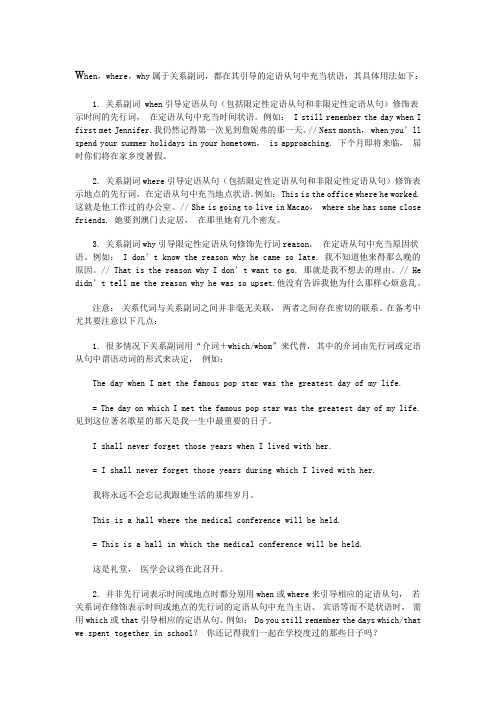
w hen,where,why属于关系副词,都在其引导的定语从句中充当状语,其具体用法如下:1. 关系副词 when引导定语从句(包括限定性定语从句和非限定性定语从句)修饰表示时间的先行词,在定语从句中充当时间状语。
例如: I still remember the day when I first met Jennifer.我仍然记得第一次见到詹妮弗的那一天。
// Next month,when you’ll spend your summer holidays in your hometown, is approaching. 下个月即将来临,届时你们将在家乡度暑假。
2. 关系副词where引导定语从句(包括限定性定语从句和非限定性定语从句)修饰表示地点的先行词,在定语从句中充当地点状语。
例如: This is the office where he worked. 这就是他工作过的办公室。
// She is going to live in Macao, where she has some close friends. 她要到澳门去定居,在那里她有几个密友。
3. 关系副词why引导限定性定语从句修饰先行词reason,在定语从句中充当原因状语。
例如:I don’t know the reason why he came so late. 我不知道他来得那么晚的原因。
// That is the reason why I don’t want to go. 那就是我不想去的理由。
// He didn’t tell me the reason why he was so upset.他没有告诉我他为什么那样心烦意乱。
注意:关系代词与关系副词之间并非毫无关联,两者之间存在密切的联系。
在备考中尤其要注意以下几点:1. 很多情况下关系副词用“介词+which/whom”来代替,其中的介词由先行词或定语从句中谓语动词的形式来决定,例如:The day when I met the famous pop star was the greatest day of my life.= The day on which I met the famous pop star was the greatest day of my life.见到这位著名歌星的那天是我一生中最重要的日子。
定语从句的关系副词

定语从句的关系副词定语从句是指修饰名词或代词的从句,描述并限定其所修饰的名词或代词的性质、特征、状态等。
而关系副词在定语从句中起到连接作用,引导定语从句的引导词。
一、关系副词及其用法关系副词常见的有:when、where和why,它们分别表示时间、地点和原因。
在定语从句中,关系副词作为关系词引导从句,起到连接主句和从句的作用。
1. when当我们在定语从句中修饰表示时间的名词时,可以用关系副词when引导。
示例1:I still remember the day when we first met.译文:我仍然记得我们第一次见面的那天。
示例2:Do you remember the moment when you realized you were in love?译文:你还记得你意识到自己爱上了的那一刻吗?2. where当我们在定语从句中修饰表示地点的名词时,可以用关系副词where引导。
示例1:This is the house where I grew up.译文:这是我长大的房子。
示例2:She took me to the park where we used to play.译文:她带我去了我们过去常常玩的那个公园。
3. why当我们在定语从句中修饰表示原因的名词时,可以用关系副词why引导。
示例1:That is the reason why I couldn’t attend the meeting.译文:那就是我不能参加会议的原因。
示例2:Can you explain the reason why you made that decision?译文:你能解释一下你作出那个决定的原因吗?二、关系副词的注意事项1. 注意关系词的位置关系副词在定语从句中作为关系代词引导从句时,要放在名词之后。
示例1:I could never forget the day (when) we won the championship.译文:我永远不会忘记我们赢得冠军的那一天。
关系副词引导的定语从句
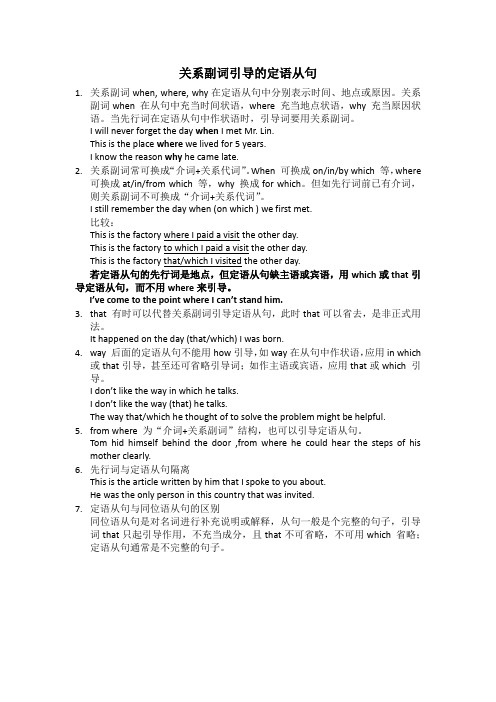
关系副词引导的定语从句1.关系副词when, where, why在定语从句中分别表示时间、地点或原因。
关系副词when 在从句中充当时间状语,where 充当地点状语,why 充当原因状语。
当先行词在定语从句中作状语时,引导词要用关系副词。
I will never forget the day when I met Mr. Lin.This is the place where we lived for 5 years.I know the reason why he came late.2.关系副词常可换成“介词+关系代词”。
When 可换成on/in/by which 等,where可换成at/in/from which 等,why 换成for which。
但如先行词前已有介词,则关系副词不可换成“介词+关系代词”。
I still remember the day when (on which ) we first met.比较:This is the factory where I paid a visit the other day.This is the factory to which I paid a visit the other day.This is the factory that/which I visited the other day.若定语从句的先行词是地点,但定语从句缺主语或宾语,用which或that引导定语从句,而不用where来引导。
I’ve come to the point where I can’t stand him.3.that 有时可以代替关系副词引导定语从句,此时that可以省去,是非正式用法。
It happened on the day (that/which) I was born.4.way 后面的定语从句不能用how引导,如way在从句中作状语,应用in which或that引导,甚至还可省略引导词;如作主语或宾语,应用that或which 引导。
关系副词引导定语从句和状语从句
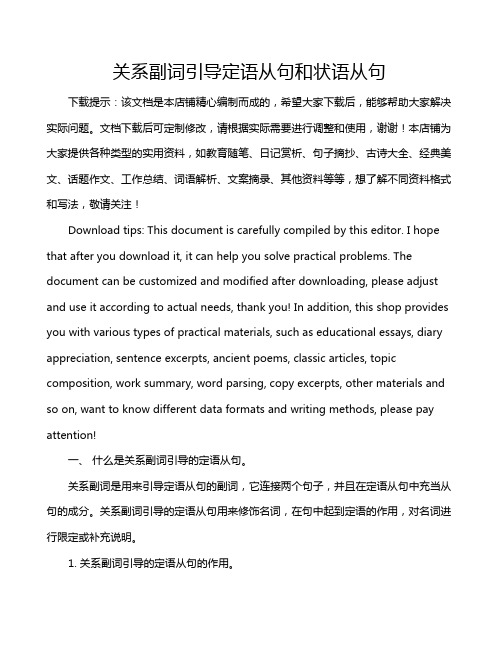
关系副词引导定语从句和状语从句下载提示:该文档是本店铺精心编制而成的,希望大家下载后,能够帮助大家解决实际问题。
文档下载后可定制修改,请根据实际需要进行调整和使用,谢谢!本店铺为大家提供各种类型的实用资料,如教育随笔、日记赏析、句子摘抄、古诗大全、经典美文、话题作文、工作总结、词语解析、文案摘录、其他资料等等,想了解不同资料格式和写法,敬请关注!Download tips: This document is carefully compiled by this editor. I hope that after you download it, it can help you solve practical problems. The document can be customized and modified after downloading, please adjust and use it according to actual needs, thank you! In addition, this shop provides you with various types of practical materials, such as educational essays, diary appreciation, sentence excerpts, ancient poems, classic articles, topic composition, work summary, word parsing, copy excerpts, other materials and so on, want to know different data formats and writing methods, please pay attention!一、什么是关系副词引导的定语从句。
关系副词是用来引导定语从句的副词,它连接两个句子,并且在定语从句中充当从句的成分。
关系副词引导的定语从句详解

关系副词引导的定语从句详解关系副词引导的定语从句详解英语(English)是一种西日耳曼语支,最早被中世纪的英国使用,并因其广阔的殖民地而成为世界使用面积最广的语言。
下面是店铺为大家整理的关系副词引导的定语从句详解,欢迎阅读与收藏。
关系副词引导的定语从句详解篇11、基本用法定语从句除可用关系代词引导外,还可用关系副词when, where与why来引导,它们的区别是:when用于指时间,where用于指地点,why用于指原因。
when, where, why 在定语从句中均用作状语。
如:1980 was the year when he was born. 1980是他的出生年。
This is the town where I was born. 这就是我出生的城市。
These are the reasons why we do it. 这些就是我们这样做的理由。
2、先行词问题关系副词when和where的先行词是表示时间(如the day, the days, the time, the year等)和地点(如the place, the house, the factory, the station等)的一类词,而关系副词why的先行词通常只是whythe reason(s)。
另外,when和where可引导限制性和非限制性定语从句,而why则只用于引导限制性定语从句,不用于引导非限制性定语从句。
3、一点注意注意不要以为在时间名词后就一定用关系副词when,在地点名词后就一定用关系副词 where,在表示原因的the reason后就一定用关系副词why。
到底选用关系副词还是关系代词,关键是看它们在定语是用作状语(用关系副词)还是用作主语或宾语(用关系代词)。
如:Don’t forget the time (that) I’ve told you. 不要忘记我告诉你的时间。
(that用作told的宾语)I’ll never forget the days when I worked with you. 我永远不会忘记我与你共事的日子。
关系副词引导的定语从句例句

关系副词引导的定语从句例句关系副词在英语中起到引导定语从句的作用。
定语从句是一个修饰名词的从句,用来进一步描述或限定名词的特定信息。
关系副词引导的定语从句常常用来描述时间、地点、原因等方面的信息。
下面是一些关系副词引导的定语从句的例句,帮助我们更好地理解和运用它们。
1. The house where I grew up has been sold.(我长大的那所房子已经卖掉了。
)在这个句子中,关系副词"where"引导了定语从句,修饰了名词"house",并且在从句中作为地点的引导词。
定语从句进一步描述了房子的位置,指的是"我长大的那所房子"。
2. I don't know the reason why he left.(我不知道他离开的原因。
)"why"在这个句子中是一个关系副词,引导了定语从句,修饰了名词"reason",在从句中作为原因的引导词。
定语从句进一步描述了他离开的原因。
3. Can you show me the book when you finish reading it?(你读完这本书后能给我看吗?)"when"在这个句子中是一个关系副词,引导了定语从句,修饰了名词"book",在从句中作为时间的引导词。
定语从句进一步描述了读书的时间。
4. This is the place where we first met.(这是我们第一次见面的地方。
)在这个句子中,关系副词"where"引导了定语从句,修饰了名词"place",并且在从句中作为地点的引导词。
定语从句进一步描述了我们第一次见面的地方。
5. The reason why she didn't come to the party remains unknown.(她为什么没有来参加派对的原因仍然未知。
英语语法之关系副词引导的定语从句

№.4英语语法之关系副词引导的定语从句关系副词是引导定语从句的一类词语,用于连接主句和从句,并在从句中充当状语。
常见的关系副词有:where、when、why。
1. Where(在哪里),用于引导地点状语从句,在从句中充当地点状语,以下是关于where的几点用法:(1)指代具体地点:- This is the school where I study.(这就是我学习的学校。
)- I often go to the caféwhere they serve delicious coffee.(我经常去那家咖啡馆,他们的咖啡很好喝。
)(2)指代抽象地点:- The library is where I find peace and quiet.(图书馆是我找到宁静的地方。
)- The park is where families gather on weekends.(公园是周末家庭聚集的地方。
)(3)表示定位或移动的地点:- He lives in a small town where everyone knows each other.(他住在一个小镇,每个人都互相认识。
)- We went hiking in the mountains where the air is fresh.(我们去了山区徒步旅行,那里空气清新。
)(4)引导限制性定语从句:- I found the book where I left it.(我找到了我放的书。
)- The house where he grew up has been demolished.(他长大的房子已经被拆除了。
)当使用where引导地点状语从句时,需要注意以下几点:(1)确定先行词:在使用where引导定语从句之前,要确保已经明确了先行词,即被修饰的名词或代词。
这样可以使从句更加清晰和连贯。
(2)引导限制性定语从句:where通常用来引导限制性定语从句,对先行词进行具体描述和限定,提供必要的信息。
关系副词引导的定语从句

关系副词引导的定语从句关系副词的用法一.关系副词where引导的定语从句。
where引导的定语从句其先行词往往是表示地点的名词。
1.China is the only country where wild pandas can be found.2.This is the house where I lived two years ago.知识拓展:如果定语从句分别修饰point, situation, stage, condition和case, position 等表示抽象意义的词,常用where / prep + which引导,意思是“到了某种地步,在某种境况中”。
I’ve come to the point where I can’t stand him.I have reached a point in my life where?I am supposed to make decisions of my own.练一练1. It’s helpful to put children in a situation ?_______ they can see themselves differently. ??2. Life is like a long race _____we compete with others to go beyond ourselves.3. They will fly to Washington, ___ they plan to stay for two or three days.二.关系副词when引导的定语从句when引导的定语从句其先行词往往是表示时间的名词。
The time when I first met Nelson Mandela was a very difficult period of my life.Ican’t forget the year when I studied English in Beijing University.练一练:1. Because of the financial crisis, days are gone _____ local 5-star hotels charged 6,000 yuan for one night.2. We went through a period ___ communications were very difficult in the rural areas.3. Occasions are quite rare _____ I have the time to spend a day with my kids.三.关系副词why 引导的定语从句。
关系副词引导的定语从句

关系副词引导的定语从句关系副词和关系代词一样,具有各种作用:在定语从句中代替先行词、在从句中做状语,把两个句子连接成一个带有定语从句的主从复合句。
由于关系副词在从句中均做状语,所以具体选用什么副词,主要取决于关系副词在从句中充当什么类型的状语。
1.关系副词where的用法由where引导的定语从句,其先行词主要表示地点的名词,如building,city,room,school等,where在从句中作地点状语。
1)-The hotel was very clean.-We stayed there/at the hotel.→The hotel where we stayed was very clean.=The hotel at which we stayed was very clean.(Where在从句中代替at the hotel,作地点状语)2)This is the house where I was born.3)It is in Beijing where the 29th Olympic Games was held.2,关系副词when的用法由when引导的定语从句,其先行词主要表示时间的名词,如time,day,date等,when在从句中作时间状语。
1)-I’ll never forget the time.-We first met during that time.→I’ll never forget the time when we first met.=I’ll never forget the time during which we first met.(when在从句中代替during that time,作时间状语)2)Do you still remember one afternoon ten years ago when I came to your house and borrowed a diamond necklace?3.关系副词why的用法由why引导的定语从句,经常会用在先行词reason的后面,why在从句中作原因状语。
定语从句之关系副词

case, state等在定语从句中做地点状
语时,定语从句用关系副词where引
导。 注意:此时定语从句中不可再出现表 示地点的词。
换成
the
This was a place.
An earthquake happened there.
去掉there
This was the place where an
4)当先行词被序数词修饰时。 That is the last thing that I’d like to do.
5)当先行词为人物共存时。 (俗称:先行 词既有人又有物。) He told me about the persons and things that he met with in Europe. 6)被修饰词为数词时。 Yesterday, I caught two fish and put them in a basin of water. Now you can see the two that are still alive.
why = for which
先行词
关系副词
for This is the reason why
he was late.
which
这是他迟到的原因。
练 习
1. This is the reason ____ he was late.
A. that B. which C. why D. when 2. The police couldn’t tell the reason
先行词
关系副词
This is the office where at which he works. 此句可表述为,He works at the office. 从句缺地点状语,at the office 表示地点, 因此用关系副词where,也可用at which, 在这里at which = where
定语从句是由关系代词或关系副词引导的从句

定语从句是由关系代词或关系副词引导的从句,其作用是作定语修饰主句的某个名词性成分,相当于形容词,所以又称为形容词性从句,一般紧跟在它所修饰的先行词后面。
2.关系词:引导定语从句的关联词称为关系词,关系词有关系代词和关系副词。
关系代词有that, which, who, whom, whose, as 等,绝对没有WHAT;关系副词有where, when, why等。
关系词常有3个作用:①连接作用,引导定语从句。
②代替主句中的先行词,甚至可能是主句中的一部分或者整个主句。
③在定语从句中充当一句子成分。
注:关系代词有主语、宾语之分。
一般whom作为宾语。
3.定语:定语用来限定、修饰名词或代词的,是对名词或代词起修饰、限定作用的词、短语(动词不定式短语、动名词短语和分词短语)或句子,汉语中常用‘……的’表示。
主要由形容词担任,此外,名词,代词,数词,分词,副词,不定式以及介词短语也可以来担任,也可以由一个句子来担任。
单词作定语时通常放在它所修饰的词之前,作前置定语。
短语和从句作定语时则放在所修饰的词之后,作后置定语。
4、先行词:被定语从句修饰的名词、代词称为先行词。
[编辑本段]关系代词引导的定语从句举例关系代词所代替的先行词是人或物的名词或代词,并在从句中充当主语、宾语、定语等成分。
关系代词在定语从句中作主语时,从句谓语动词的人称和数要和先行词保持一致。
1、who, whom, that这些词代替的先行词是人的名词或代词,在从句中所起作用如下:(1) Is he the man who/that wants to see you? 他就是想见你的人吗?(who/that在从句中作主语)(2) He is the man whom/ that I saw yesterday. 他就是我昨天见的那个人。
(whom/that在从句中作宾语)2、Whose 用来指人或物(只用作定语, 若指物,它还可以同of which互换,指人的时候也可以用of whom 代替)(1) They rushed over to help the man whose car had broken down. 那人车坏了,大家都跑过去帮忙。
定语从句的关系词引导修饰关系的词语
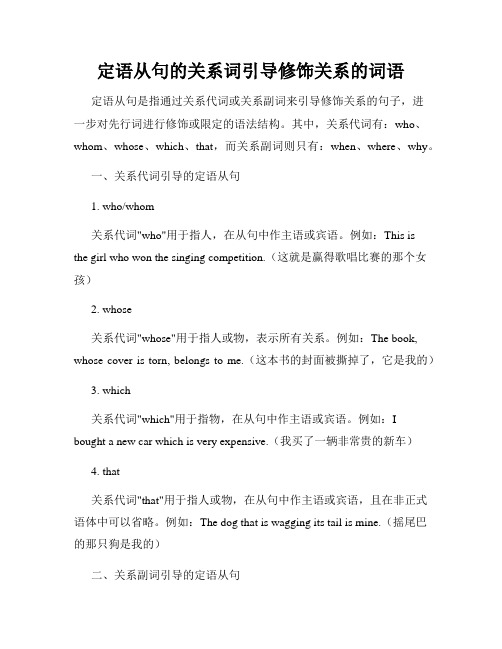
定语从句的关系词引导修饰关系的词语定语从句是指通过关系代词或关系副词来引导修饰关系的句子,进一步对先行词进行修饰或限定的语法结构。
其中,关系代词有:who、whom、whose、which、that,而关系副词则只有:when、where、why。
一、关系代词引导的定语从句1. who/whom关系代词"who"用于指人,在从句中作主语或宾语。
例如:This isthe girl who won the singing competition.(这就是赢得歌唱比赛的那个女孩)2. whose关系代词"whose"用于指人或物,表示所有关系。
例如:The book, whose cover is torn, belongs to me.(这本书的封面被撕掉了,它是我的)3. which关系代词"which"用于指物,在从句中作主语或宾语。
例如:I bought a new car which is very expensive.(我买了一辆非常贵的新车)4. that关系代词"that"用于指人或物,在从句中作主语或宾语,且在非正式语体中可以省略。
例如:The dog that is wagging its tail is mine.(摇尾巴的那只狗是我的)二、关系副词引导的定语从句1. when关系副词"when"用于指时间,在从句中修饰先行词。
例如:I still remember the day when we first met.(我依然记得我们第一次见面的那一天)2. where关系副词"where"用于指地点,在从句中修饰先行词。
例如:This is the school where I used to study.(这是我曾经读过书的学校)3. why关系副词"why"用于指原因,在从句中修饰先行词。
高中英语语语法知识点:关系副词引导的定语从句
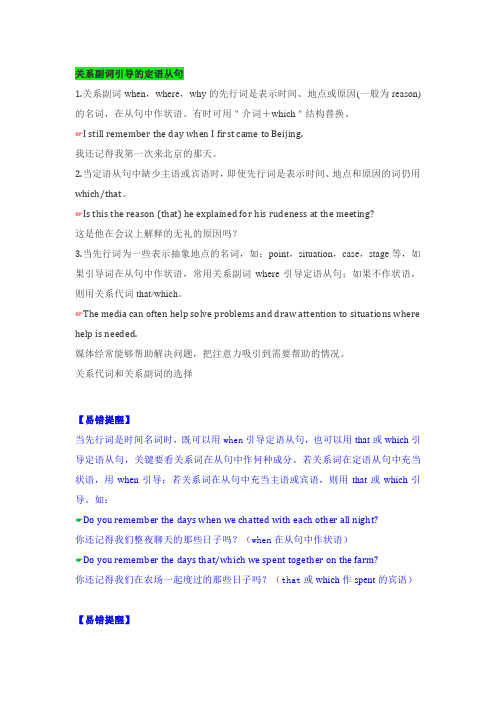
关系副词引导的定语从句1.关系副词when,where,why的先行词是表示时间、地点或原因(一般为reason)的名词,在从句中作状语。
有时可用"介词+which"结构替换。
☞I still remember the day when I first came to Beijing.我还记得我第一次来北京的那天。
2.当定语从句中缺少主语或宾语时,即使先行词是表示时间、地点和原因的词仍用which/that。
☞Is this the reason (that) he explained for his rudeness at the meeting?这是他在会议上解释的无礼的原因吗?3.当先行词为一些表示抽象地点的名词,如:point,situation,case,stage等,如果引导词在从句中作状语,常用关系副词where引导定语从句;如果不作状语,则用关系代词that/which。
☞The media can often help solve problems and draw attention to situations where help is needed.媒体经常能够帮助解决问题,把注意力吸引到需要帮助的情况。
关系代词和关系副词的选择【易错提醒】当先行词是时间名词时,既可以用when引导定语从句,也可以用that或which引导定语从句,关键要看关系词在从句中作何种成分。
若关系词在定语从句中充当状语,用when引导;若关系词在从句中充当主语或宾语,则用that或which引导。
如:☛Do you remember the days when we chatted with each other all night?你还记得我们整夜聊天的那些日子吗?(when在从句中作状语)☛Do you remember the days that/which we spent together on the farm?你还记得我们在农场一起度过的那些日子吗?(that或which作spent的宾语)【易错提醒】1. 当先行词为地点名词时,如果关系词在从句中作主语或宾语,则用that或which 引导。
高一英语定语从句---关系副词的用法(含例句及解析)
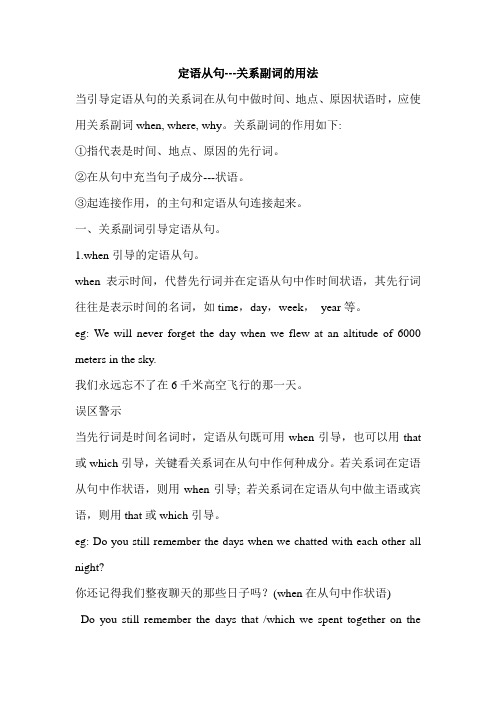
定语从句---关系副词的用法当引导定语从句的关系词在从句中做时间、地点、原因状语时,应使用关系副词when, where, why。
关系副词的作用如下:①指代表是时间、地点、原因的先行词。
②在从句中充当句子成分---状语。
③起连接作用,的主句和定语从句连接起来。
一、关系副词引导定语从句。
1.when引导的定语从句。
when表示时间,代替先行词并在定语从句中作时间状语,其先行词往往是表示时间的名词,如time,day,week,year等。
eg: We will never forget the day when we flew at an altitude of 6000 meters in the sky.我们永远忘不了在6千米高空飞行的那一天。
误区警示当先行词是时间名词时,定语从句既可用when引导,也可以用that 或which引导,关键看关系词在从句中作何种成分。
若关系词在定语从句中作状语,则用when引导; 若关系词在定语从句中做主语或宾语,则用that或which引导。
eg: Do you still remember the days when we chatted with each other all night?你还记得我们整夜聊天的那些日子吗?(when在从句中作状语)Do you still remember the days that /which we spent together on thefarm?你还记得我们在农场一起度过的那些日子吗?(that/which做spend的宾语)2.where引导的定语从句where表示地点, 代替先行词并在定语从句中做地点状语,其先行词往往是表示地点的名词,如place , factory,house, village等或表示抽象地点的名词,如position, point, case , stage,situation,atmosphere 等。
- 1、下载文档前请自行甄别文档内容的完整性,平台不提供额外的编辑、内容补充、找答案等附加服务。
- 2、"仅部分预览"的文档,不可在线预览部分如存在完整性等问题,可反馈申请退款(可完整预览的文档不适用该条件!)。
- 3、如文档侵犯您的权益,请联系客服反馈,我们会尽快为您处理(人工客服工作时间:9:00-18:30)。
关系副词引导的定语从句
一.关系副词where引导的定语从句。
where引导的定语从句其先行词往往是表示地点的名词。
1.China is the only country where wild pandas can be found.
2.This is the house where I lived two years ago.
知识拓展:
如果定语从句分别修饰point, situation, stage, condition和case, position 等表示抽象意义的词,常用where / prep + which引导,意思是“到了某种地步,在某种境况中”。
I’ve come to the point where I can’t stand him.
I have reached a point in my life where I am supposed to make decisions of my own.
练一练
1. It’s helpful to put children in a situation _______ they can see themselves differently.
2. Life is like a long race _____we compete with others to go beyond ourselves.
3. They will fly to Washington, ___ they plan to stay for two or three days.
二.关系副词when引导的定语从句
when引导的定语从句其先行词往往是表示时间的名词。
The time when I first met Nelson Mandela was a very difficult period of my life.
Ican’t forget the year when I studied English in Beijing University.
练一练:
1. Because of the financial crisis, days are gone _____ local 5-star hotels charged 6,000 yuan for one night.
2. We went through a period ___ communications were very difficult in the rural areas.
3. Occasions are quite rare _____ I have the time to spend a day with my kids.
三.关系副词why 引导的定语从句。
why引导的定语从句其先行词是reason。
The reason why he didn’t come to the party is that he didn’t want to see Jane.
Can you tell me the reason why you are late?
练一练
1) The reason ________he didn’t come was that he was ill.
2) The reason __________ he explained is not true.
3) The reason ___ he was absent was ___ he had a bad cold.
四.“介词+ 关系代词”引导的定语从句:介词后的关系代词只能是which (指物)whom(指人)
介词选择的原则:
一)介词根据从句谓语动词的搭配习惯而确定
on which I spent 5 yuan .
for which I paid 5 yuan .
This is the book from which I learnt a lot.
about which Tom often talks
二). 介词根据先行词的搭配习惯而确定
I remember the day on which I joined the Party.
the days during which I lived here.
the month in which I stayed there.
三). 介词根据从句所表达的意义而确定
My computer, without which I can’t play computer games, crashed yesterday.
Learning a country’s culture is like opening a window, through which you can know about that country better.
练一练
1. Gun control is a subject _____ Americans have argued for a long time.
2. The house I grew up ____ has been taken down and replaced by an office building.
3. Tom received training in a computer for one year , _______ he found a job in a big company.
4. We saw several natives advancing towards our party, and one of them came up to us, ____ we gave some bells and glasses.
5. He paid the boy $10 for washing ten w indows, most of ____ hadn’t been cleaned for ten years.
五.定语从句与其他从句的比较
1. 非限制性定语从句和单句/并列句的比较
He has two sons. Both of_____ are teachers. (句)
He has two sons, and both of ______are teachers. (句)
He has two sons; both of _____are teachers. (句)
He has two sons, both of _______are teachers. (句)
练一练:
1.Do you think such a place ____ you speak of is worth visiting?
2.He promised to come to see me on purpose on Sunday, _____ I doubt very much.
3.There is a lake near our schoolyard, _____ depth is out of your expectation.
4.——Do you have anything in mind _____ you’d like for supper?
——Well, anything is Ok for me.
5.The house in _______ he used to live has turned into a library.
6.Students in our school, most of _____ are from the south of China, enjoy rice very much.
7.Can you think of a situation ______ this idiom is used?
8.____ is often the case, teachers in our school usually return to school on Sunday evenings.
9.Which is the road _____ leads to the village ______ you were born?
10.The newcomer is from Jiangxi, _____ I can tell from his accent.
11. Alec asked the policeman _____ he worked to contact (联系) him whenever there was an accident.(上海)
12. We are living in an age _____ many things are done on computers. (北京)
13. I can think of many cases _____ students obviously knew a lot of English words and expressions but couldn’t write a good essay. (上海)
14. The English play _____ my students acted at the New Year’s party was a success. (安徽)
15. The old scientist, for _____ life was hard in the past, still works very hard in his eighties.。
